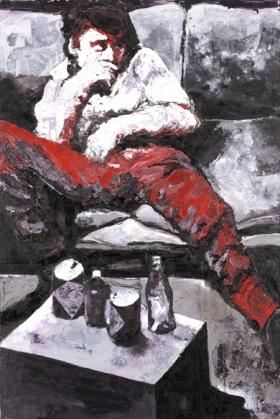Fred Kleinberg "Monstre-toi"
Fred Kleinberg – Monstre-toi
Fred Kleinberg no longer exhibits the frontal self-portraits, full of anger and mystery, which he carried out on paper several years ago in Rome. Nor does he exhibit the barely human, cast-off figures that he painted in Moscow and Pondichéri in the last years.
He is now working on a new series in Paris. As always, the result is caustic and politically incorrect. Formerly a songwriter before taking up painting in the 1980s, he now returns to his first love: he paints rock stars. «Chosen for having stuck to their beliefs», as he says, and for their «reckless» personalities, their names are Iggy Pop, Joe Strummer, Patty Smith, Johnny Cash or Nick Cave. All of them legends, as mythical as «monstres sacrés»!
Thick textures, loud colours, acid contrasts, shifted frames, huge close-ups and formats: the postures are frozen, the atmosphere is electric, the insolence of the glances is essential. The subjects are represented in their time off between two concerts, suspended in emptiness, anxious but busy ; they are at rest, yet alert. «To make space for their human side », that is the project. The permanence of legitimate anger, the power of a vigilance too rare, the danger of existing with awareness, that is the reality he celebrates.
«To break loose from the image and make room for the energy of painting». Archive photos are the starting point of his paintings. The shoots give way to the painter’s inspiration: visions probed by the brush, intuitions sublimated by colour. »
«What should we do with these rock icons turned into painted humans?», asks the art critic Joëlle Péhaut, and she adds : «Here lies the true violence. As if, once taken out of context, these icons gained a universal reach. Like when we cut the sound off the evening news, and all of a sudden it is no longer information. These paintings talk about something else. They talk about possible existences that are dangerous, tasty, exemplary and respectful of life. Lives of artists. Lives that sometimes lead to death without intending to cause it.»
Françoise Monnin, Paris, October 2008
